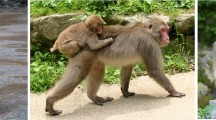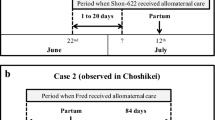Abstract
This study reports cases in which grandmothers and other closely related adult females cared for orphans in the Arashiyama E-troop, a provisioned troop of Japanese macaques (Macaca fuscata). I observed the behavioral patterns of three orphans (aged 1, 2, and 3 years, respectively). The grandmothers cared for two orphans, while three other closely related adult females cared for the rest of the orphans whose grandmothers were absent. These observations differ from those of previous studies that reported that grandmothers were indifferent towards orphans. This intraspecific variation may be attributed to the demographic conditions of the troop in this study, which had only a few related nulliparous adult females, as a result of artificial birth control. In this group, adult females showed decreased fecundity and an increased interbirth interval as they received birth control treatment; thus, in the absence of their own dependent infants, these females may have invested time in the care of related orphans. Although caregiving by grandmothers is believed to be rare or insignificant in primates, this study suggests that grandmothers and other closely related adult females play an important role for orphans in troops with few related adult females.

Similar content being viewed by others
References
Agoramoorthy G, Rudran R (1992) Adoption in free-ranging red howler monkeys, Alouatta seniculus of Venezuela. Primates 33:551–555
Altmann J (1974) Observational study of behaviour: sampling methods. Behaviour 49:227–265
Berman CM (1982) The social development of an orphaned Rhesus infant on Cayo Santiago: male care, foster mother-orphan interaction and peer interaction. Am J Primatol 3:131–141
Fedigan LM, Pavelka MSM (2006) Reproductive cessation in female primates. In: Campbell C, Fuentes A, MacKinnon KC, Panger M, Bearder S (eds) Primates in perspective. Oxford University Press, New York, pp 437–447
Hanya G, Matsubara M, Sugiura H, Hayakawa S, Goto S, Tanaka T, Noma N (2004) Mass mortality of Japanese macaques in a western coastal forest of Yakushima. Ecol Res 19:179–188
Hasegawa T, Hiraiwa M (1980) Social interactions of orphans observed in a free-ranging troop of Japanese monkeys. Folia Primatol 33:129–158
Hiraiwa M (1981) Maternal and alloparental care in a troop of free-ranging Japanese monkeys. Primates 22:309–329
Itani J (1959) Paternal care in the wild Japanese monkey, Macaca fuscata fuscata. Primates 2:61–94
Koyama N, Tanaka Y, Huffman AM, Norikoshi K, Suzuki H (1992) Reproductive parameters of female Japanese macaques: thirty years data from the Arashiyama troops, Japan. Primates 33:33–47
Mayer PJ (1982) Evolutionary advantage of the menopause. Hum Ecol 10:477–494
Muroyama Y (1995) Developmental changes in mother-offspring grooming in Japanese macaques. Am J Primatol 37:57–64
Spencer-Booth Y (1968) The behaviour of group companions towards rhesus monkey infants. Anim Behav 16:541–557
Yamada K, Nakamichi M, Shizawa Y, Yasuda J, Imakawa S, Hinobayashi T, Minami T (2005) Grooming relationships of adolescent orphans in a free-ranging group of Japanese macaques (Macaca fuscata) at Katsuyama: a comparison among orphans with sisters, orphans without sisters, and females with a surviving mother. Primates 46:145–150
Acknowledgments
I appreciate the assistance provided by the staff of Iwatayama Monkey Park. I thank Dr. Juichi Yamagiwa, Dr. Naofumi Nakagawa, and Dr. Michio Nakamura, Faculty of Science, Kyoto University, for providing comprehensive guidelines for conducting this study. I am grateful to Dr. Nobuyuki Kutsukake at the Graduate University for Advanced Studies, Lee Sean and Dr. Toshikazu Hasegawa at the University of Tokyo for reading the initial version of this manuscript and providing valuable comments.
Author information
Authors and Affiliations
Corresponding author
About this article
Cite this article
Nozaki, M. Grandmothers care for orphans in a provisioned troop of Japanese macaques (Macaca fuscata). Primates 50, 85–88 (2009). https://doi.org/10.1007/s10329-008-0118-x
Received:
Accepted:
Published:
Issue Date:
DOI: https://doi.org/10.1007/s10329-008-0118-x




